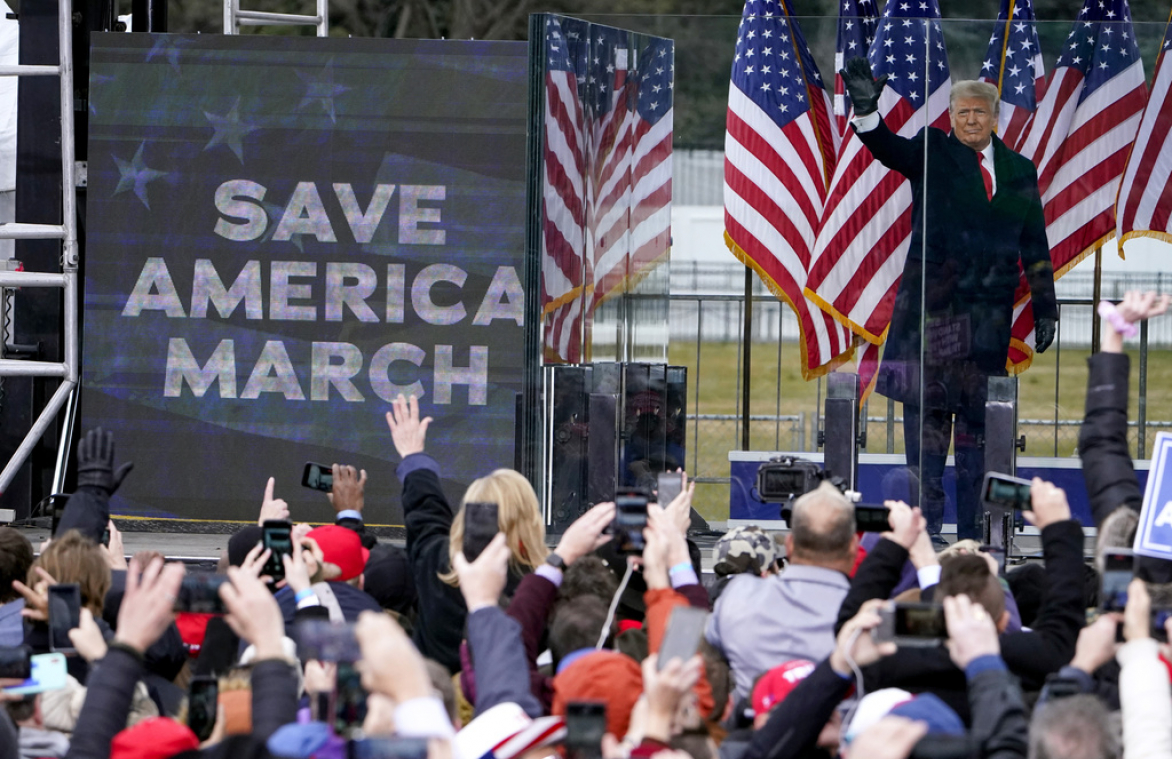President Donald Trump arrives to speak at a rally in Washington, on Jan. 6, 2021, where he claimed that election fraud caused him to lose the election and urged his supporters to “fight.” An indictment on Aug. 2, 2023, charges the now ex-president with three counts of conspiracy and one count of obstruction related to the attack on the U.S. Capitol that took place after the Trump rally. AP Photo/Jacquelyn Martin, file
After special counsel Jack Smith and a District of Columbia grand jury released three counts of conspiracy and one count of obstruction against former president Donald Trump on Aug. 2, 2023, his lawyers almost immediately countered that the charges interfered with Trump’s right to freedom of speech under the First Amendment to the U.S. Constitution.
Political speech, especially by a U.S. president, is certainly quite important, and it would be particularly distressing if an existing administration could bring charges against prior administrations for speech with which they disagreed.
Indictment does not include incitement of Jan. 6 mob
For those who have long been awaiting the grand jury charges, however, one of the most remarkable omissions in the charges is an indictment of Trump for incitement of the mob that swarmed the U.S. Capitol building on Jan. 6, 2021. Recognizing that governments had previously sometimes cried “clear and present danger” when there was arguably no such danger, the Supreme Court, in Brandenburg v. Ohio (1969), a case involving a speaker at a Ku Klux Klan rally, had raised the bar against such prosecution by requiring the government to prove that advocacy was “directed to inciting or producing imminent lawless action and is likely to incite or produce such action.”
It is quite possible that Trump’s words on the Ellipse that day would qualify as such incitement even under this rigid standard. In his lengthy speech to a crowd — some of whose members would soon be attacking the Capitol — he repeatedly lied about election results and raised allegations of fraud that had repeatedly been struck down by federal courts. Toward the end of the speech, he said: “And we fight. We fight like hell. And if you don’t fight like hell, you’re not going to have a country anymore.” Moreover, his relative inaction in the ensuing chaos suggests that his words may have had precisely the impact he intended.
Be this as it may, the third paragraph of the indictment against Trump clearly states that “The Defendant had a right, like every American, to speak publicly about the election and even to claim, falsely, that there had been outcome-determinative fraud during the election and that he had won. He was also entitled to formally challenge the results of the election through lawful and appropriate means, such as by seeking recounts or audits of the popular vote in states or filing lawsuits challenging ballots and procedures.” After observing that “the Defendant did pursue these methods of contesting the election results,” the indictment further observed that “His efforts to change the outcome in any state through recounts, audits, or legal challenges were uniformly unsuccessful.”
Charges against Trump include conspiracy, obstruction
Having established that the First Amendment is capacious enough even to cover false speech, the indictment proceeds to outline charges of conspiracy and obstruction. Following long-established precedents, it thus moved the focus from the questionable words that Trump spoke to what it alleges to be his illegal actions.
As duplicitous as it might be, some individuals routinely lie. If lies destroy another person’s reputation, the person has the right to sue for slander or libel. If lies are uttered in court while under oath, the court may issue penalties for perjury even though the same lies, spoken out of court, would not be criminal. An individual who openly wishes that all politicians would drop dead does not have the same legal culpability as one who hires a hitman or plans an assassination.
Actions involving the 2020 presidential election, like most human activities, involved conversations. It is difficult to engage in a conspiracy without speaking, but the speech, without its tie to actions or intended actions, would be constitutionally protected. There is a big difference between claiming, even falsely, that an election was rigged, that it was unfair, or that it was fraudulent and plotting to “find” nonexistent votes, to obstruct congressional proceedings during which electoral votes are to be counted, to overturn electoral results by conspiring to draw up lists of fake electors and have them submitted to Congress, or to pressure one’s vice president to convert a purely ministerial vote-counting function into a discretionary power to thwart electoral results.
To draw a comparison, as an ex-president, Trump has every right to claim that the system of classifying documents is too rigid, that it should not apply to ex-presidents, or even that he could declassify a document simply by wishing it so. This has not kept him from being indicted on charges that he took such documents with him after leaving the White House, lied about having them, and attempted to conceal their existence.
In short, although Trump’s attorneys have arguably highlighted the importance of recognizing the First Amendment’s protection of freedom of speech, especially political speech, the fact that the attorneys feel free to invoke this right even while ignoring the distinction between speech and action suggests that it remains alive and well.
John Vile is a professor of political science and dean of the Honors College at Middle Tennessee State University. He is co-editor of the Encyclopedia of the First Amendment. This article was published Aug. 3, 2023.

